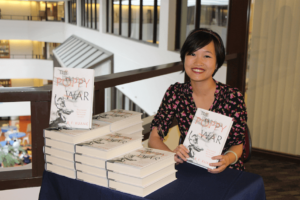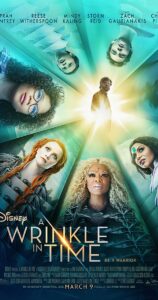Tag: Sara Conway ’21
Revealing Another Kind of History: R.F. Kuang’s The Poppy War
by The Cowl Editor on August 30, 2018
Arts & Entertainment

by Sara Conway ’21
A&E Staff
On her website, author R.F. Kuang explains why she focused her debut novel, The Poppy War, on the 1937 Rape of Nanjing. Kuang writes, “The west has never done a good job of caring about sexual violence done to women who aren’t white,” and states that she would “like to depict the acts in bloody, brutal, stark detail.”
In fact, The Poppy War explores violent themes inspired by real events in 20th century China. Kuang compiled a list of content warnings found in her novel, including: self-harm, suicide, violent rape, sexual assault, murder, massacres, brutalization, mutilation, torture, substance abuse, abuse, emotional abuse, physical abuse, relationship abuse, human experimentation, chemical warfare, and genocide.
Literature on World War II often focuses heavily on Nazi Germany and the Holocaust; however, in her debut, Kuang sheds light on a little known, sickening story of the human cruelty that happened during World War II. The 1937 Rape of Nanjing occurred during the Sino-Japanese War after the city—then the capital of China—fell to Japanese forces.
Kuang points out in her article that some Japanese scholars still deny that the horrific event occurred. She argues that the Rape of Nanjing would never have become known to the Western world if not for the book published by Iris Chang.
The Poppy War follows a war orphan named Fang ‘Rin’ Runin who, after acing the Keju—a high stakes-exam that decides whether one is worthy of receiving further education—travels from her abusive home to the most elite military academy in the empire, Sinegard. Rin discovers that she possesses an aptitude for shamanism with the mentorship of the flightiest teacher at Sinegard.
Simultaneously, the Nikara Empire and its enemy across the sea, the Federation of Mugen, seem to be on the cusp of the Third Poppy War. Kuang creates a powerful and engaging story as she blends unexpected heroes, disappearing gods, and unknown histories.
Rin is not the average fierce heroine many readers love. Rin, rather, is a complex character who challenges the typical characteristics of a “hero.”
Kuang writes her as fiercely human; Rin wants power, and she will do anything to ensure that she will get it. She is flawed, but that is because she is a human being with human wants and an ambition that she strives to satisfy above all else.
In chapter 21, based on the Rape of Nanjing, Kuang weaves her words in such a manner that illuminates her brief, but provoking, descriptions. The destruction and treatment of human lives that Kuang writes is a horrifying, yet eye-opening, experience. Kuang illustrates the never-ending limits of human cruelty and the unspeakable ramifications when one stops noticing this kind of torture.
The Poppy War tells an unforgettable, absolutely necessary story that does not shy away from addressing the brutality of the past. Kuang concludes her explanation regarding The Poppy War by simply stating “silence hurts so much worse.”
Pain, Loss, and Love: “Immigrant: A Storyteller’s Event”
by Kerry Torpey on May 3, 2018
Arts & Entertainment

by Sara Conway ’21
A&E Staff
On Tuesday, April 24, Providence College hosted “Immigrant: A Storyteller’s Event” sponsored by the Providence Immigration Rights Coalition. Those in attendance were able to see the written and visual stories of PC students, faculty, and staff members about their personal experiences with immigration and calling the United States home.
While the creators of the showcased pieces remain nameless, the anonymity did not in any way detract from the raw emotion expressed on every canvas, whether a piece of a paper, photo paper, or poster board.
Stepping into Moore Hall 122, one was immediately enveloped by the bright colors of the artwork propped up against the walls on one side of the room. On another, quietly provoking photographs featured in slim, black frames, and the words on white paper, hung up on a line.
Some pieces, particularly the artwork, calls viewers to action, such as the poster headed with #DefendDACA (Deferred Action for Childhood Arrivals), featuring three seated people with interlocking arms and roots growing underneath them and flowers among them. In the corner of the poster reads “Rise Up As One,” asserting the connection between the three figures depicted and their desire to consider the United States their home, as the girl’s T-shirt says, “This is home.”
The Trump administration first announced their plans to end DACA—a program implemented during the administration of former president, Barack Obama, in June of 2012—in 2017, but have stopped accepting new DACA applications, renewals, and the protection of the program as of March 5, 2018.
Obama created DACA according to the recent New York Times article, “U.S. Must Keep DACA and Accept New Applications, Federal Judge Rules” by Miriam Jordan, to argue that children brought into the country when they were young “should be treated as low priorities for deportation.” Those undocumented youth who sign up are known as “The Dreamers,” although in order to stay in the program, an application for the renewal of their status is required every two years.
As seen at PC’s event, the artwork and writing gave visitors a new connection to those struggling as immigrants in the United States. The artists and writers bravely tell their stories, revealing the pain they have sought to overcome, the loss that can never quite be forced back enough into the past and the love that they still feel for the country that raised them, despite the nation’s desire to push them out.
The author of the poem, “The Unwanted, but The Grateful,” pleads with America, writing “You may not want me / But I do want you / You are all I have ever known.” Not all immigrants remember their native countries because they have built part of their lives, or in the case of the author, his entire life, in the United States.
They do not know anything else, yet they still face the discrimination of this supposedly “great” nation whose government—and many citizens—believe that they are not welcome. The writer closes his poem with a plea for compromise: “I can continue to tolerate my not belonging / If you just let me stay.”
PC Alum Preserves History with U Street Contested
by Kerry Torpey on April 19, 2018
Arts & Entertainment

by Sara Conway ’21
A&E Staff
As a historian and documentary filmmaker, Michael T. Barry, Jr. ’16 creates “films that provide a voice to people and topics” that are “often forgotten or marginalized,” according The Activist History Review.
A Providence College alumnus, Barry earned a Master’s degree in American and Middle Eastern history in 2016, and is currently working towards a PhD in history from American University. In 2014, his film Sincerity: From X to El-Shabazz was released, winning a Carter G. Woodson Award the same year. Two years later, The Universal Soldier: Vietnam, Barry’s second documentary, received the award for the Best Feature Award at the 2016 Nyack Film Festival.
His newest film was released in March. The film focuses on Washington, D.C.’s vibrant U Street and aims to bring light to the history of the neighborhood which is often ignored. This film features interviews and commentary by Dr. Ibram X. Kendi, a National Book Award winner and the founder of the Antiracist Research and Policy Center at American University, Dr. Derek Hyra, the founder of the Metropolitan Policy Center also at American University, the Twins Jazz Club owners, Kelly and Maze Tesfaye and Love-Leigh Beasley, and the organizer of Funk Parade, Chris Naoum.
The African-American roots of U Street and its thriving culture rivaled that of New York’s Harlem Renaissance, but was pushed aside by the popularity of the latter during the 1920s. Many are unaware of U Street’s history and the fact that it was home to artists, thinkers, and musicians such as Duke Ellington. However, riots and rebellions destroyed the neighborhood, especially in response to the assassination of Dr. Martin Luther King, Jr.
As a result, the old was pushed out and the new forced itself in, initiating yet another example of urban gentrification. Attempts to re-establish business in the neighborhood brought in those with more money and, with it, “cultural decimation.” U Street shifted from being a predominantly black neighborhood to one of white millennials. The flood and ignorance of the new was “ruining the history and culture” of those originally in the neighborhood.
U Street Contested aims to “preserve” and “honor” the history of U Street by recognizing and promoting it. The film does so by highlighting the importance of mom-and-pop shops in keeping the U Street culture strong, such as the Twins Jazz Club. These places, however, do struggle to survive against the competition of the area.
Another effort to revitalize the history of U Street manifests in the Funk Parade. The springtime festival launched in 2014 with the purpose of supporting the U Street neighborhood in its collaboration with local clubs and artists. This event extends all day and into the night, bringing thousands of people and different pieces of the city together in an endeavor to “minimize the gap” and celebrate the history of U Street.
U Street Contested emphasizes the importance of acknowledging the history of an area and doing so “as often as possible.” A solution to “break[ing] the segregation” rises in the engagement between the people in the area, as seen in the efforts of the Funk Parade.
Barry hopes that his new documentary “can bring people together to discuss the changes occurring in [other people’s] communities” through its “activist spirit.” In an interview with The Activist History Review, an online resource dedicated to connecting the past with the present through an activist lens, Barry emphasizes that he believes that hisotry “can bring about lasting and substantial changes in our nation and world.”
Barry and his films bring attention to those forgotten histories, a fact that should inspire the Providence College community and beyond to enact change.
For the Love of Music: An Interview with Schola Cantorum’s Student Director
by The Cowl Editor on April 12, 2018
Arts & Entertainment
Sara Conway ’21
A&E Staff
Any Providence College student who attends Mass at St. Dominic’s Chapel is familiar with the choirs whose voices flood the room with sweet melodies. Recently, I sat down with Gabrielle Manion ’18, the student director of Schola Cantorum, to talk about her experience.
Sara Conway (SC): I know that you are a music major (with a history minor), so what caused you to choose these areas of study?
Gabrielle Manion (GM): I’ve played the piano since I was in first grade, so that was always a part of my life. I wanted to continue with music in college because I had given so much of my time to it and realized I could make a living doing what I love [while] using my gifts well. I added a history minor my junior year because I’ve always had a deep fascination with history and taken many classes at college already. Music and history have a lot of overlap, but history is a way for me to explore something that I love outside of music.
SC: When did you join Schola Cantorum? How did you hear about this choir/why did you join? How did you become their student director?
GM: I joined Schola Cantorum my freshman year and have been a member ever since. I think I heard about the choir when I came and visited PC my senior year of high school. The group was listed on a program for one of the Masses. I’ve been involved in liturgical music since middle school and so I knew I would continue doing so at PC. Schola did the type of music that I have a deep appreciation for—Gregorian chant, polyphony, et cetera, so I was really eager to join. I became the student leader this year after applying through Campus Ministry. I had accompanied Schola for two years under the previous director, Susannah Clarke, so I knew the ropes pretty well.
SC: What are some positives in leading Schola? What are some of the challenges?
GM: One positive aspect of leading Schola is that I get to help and see each singer growing throughout the year. That sounds so cliché, but it’s true! I love having the opportunity to bring out the best in people’s musical gifts and see them putting their gifts to use. It’s also a great privilege to provide music for Mass so that’s definitely the highlight. There are challenges, of course. It can be hard to let go of control and realize that it’s in God’s hands. I often think that if I work the choir really hard or if I’m a better leader, we’ll do better. And then I have to step back and remember that we do our best when we offer it up to the Lord and don’t get consumed by every mistake.
SC: What is your process in choosing the music (if you have one)? What kinds of pieces especially inspire you?
GM: My process for choosing music is: I look at the readings for Mass and think about the liturgical season and mood. I want to pick things that the choir enjoys and will lift the hearts of the congregation to prayer.
SC: What is one of your favorite pieces that Schola has sung (if that is not an impossible question)? What is your greatest takeaway about leading/being part of Schola?
GM: I think my favorite piece Schola has done is Tantum Ergo by Gabriel Faure (Sorry men, I know this is a ladies only piece!). The women worked so hard on this beautiful piece. I suppose my greatest takeaway from Schola is the privilege of working with my friends to praise God. It’s a really unique opportunity since Schola is a close-knit group and it’s beautiful to share this goal with people I love.
New York City’s Books of Wonder Hosts Writing Power-Couple
by Kerry Torpey on March 15, 2018
Arts & Entertainment

by Sara Conway ’21
A&E Staff
Just when you thought author Tahereh Mafi had said goodbye to her Shatter Me characters forever, the story goes on. On March 6, Books of Wonder, located on 18th St. in Union Square, hosted Mafi and her husband, Ransom Riggs, author of Miss Peregrine’s Home for Peculiar Children, to kick off her release tour for Restore Me. This novel is the first book of a new trilogy that will continue Juliette and Warner’s stories from the original Shatter Me series.
Books of Wonder’s downtown location is tucked away from the main chaos of 5th Avenue but still easily accessible from the heart of Union Square. The bookstore is on the smaller side but is still able to boast a variety of books ranging from their young adult section to their middle grade novels.
Towards the back of the store, behind glass, are the originals of classics, which are all for sale, such as a loved copy of Where the Wild Things Are and a first edition of Harry Potter and the Chambers of Secrets. It’s a cozy and familiar place, where New Yorkers or visitors of the city can come in and get lost in a book for a few hours.
A crowd had already formed by the blocked-off seating area an hour before the 6 p.m. event, and excited chatter and the laughter of book-loving friends could be heard throughout the store. Mafi’s tour stop at Books of Wonder not only included a conversation with Riggs and a Q&A with the audience members, but also a signing, in which fans had to purchase one of Mafi’s books in order to receive an autograph.
Enthusiastic applause and an abundance of cheers followed Mafi and Riggs as they entered. Once the conversation was in full swing, Riggs asked why Mafi had decided to continue the stories of her Shatter Me characters. Mafi considered her answer for a moment, and then responded that she had gone back to reread her books and realized that there was still more story to be told; the stories of Juliette and Warner, the main characters in Restore Me, were not quite finished.
As the conversation portion of the evening came to a close, Mafi briefly spoke on her latest project, a novel recently announced entitled A Very Large Expanse of Sea to be released in October 2018. She considers it the “most autobiographical thing [she’s] ever written,” as the story follows a Muslim teen living in a post 9/11 world, an experience that she is very familiar with.
An unexpected piece of the story, as Mafi revealed, is her protagonist’s desire to breakdance, another detail from her own life. Riggs mentioned, to the crowd’s delight, that the first time he saw his wife breakdance was at the Barnes & Noble in Los Angeles.
The Books of Wonder leg of the Restore Me tour concluded with the author signings and a crowd numbering close to 100. Waiting fans browsed the bursting shelves, exclaiming over the books that they recognized. The excited chatter heard before Mafi and Riggs came into Books of Wonder leapt around the signing line and echoed among the exhilarated fans as they stepped out into the chilly night air with their personalized books.
Welcome to the Big Screen
by Kerry Torpey on March 2, 2018
Arts & Entertainment

by Sara Conway ’21
A&E Staff
The lights dim. A quiet hush of silence suddenly settles over the theater and excited moviegoers. There is something special about seeing a new movie on the big screen, watching a story unfold and characters develop right before your eyes.
It is even more magical to experience a book you love come to life. As college students who do not always have the luxury of splurging on expensive movie tickets, these are some of the most anticipated “books-to-movies” that should be at the top of your reading and watch lists.
1. A Wrinkle in Time
Release date: March 9, 2018
This classic, written by Madeleine L’Engle, is finally getting the movie upgrade that it deserves. Starring Oprah Winfrey, Reese Witherspoon, and Mindy Kaling, A Wrinkle in Time follows Meg Murry, her brother, and a classmate as they journey to a new planet, one which possesses all of the evil in the universe, to find their father, who disappeared five years previously.
2. Love, Simon
Release date: March 16, 2018
Based on the novel by Becky Albertalli, Simon vs. the Homo Sapiens Agenda, the movie Love, Simon tells the story of Simon Spier, a closeted gay high-schooler trying to survive the twists and turns that life and love throwin his way. Simon and his authentic voice are portrayed by Nick Robinson.

3. Ready Player One
Release date: March 29, 2018
Directed by Steven Spielberg, Ready Player One is based on the novel of the same name by Ernest Cline. Protagonist Wade Watts joins the hunt for the digital Easter egg in the OASIS, a virtual reality universe, for a chance to inherit the fortune the creator left behind after he died. The stakes are even higher as Wade lives in a 2045 world threatened by chaos.
4. The Darkest Minds
Release date: August 3, 2018
Alexandra Bracken’s novel, The Darkest Minds, is set in a disease-ridden world that destroyed 98 percent of America’s children. The remaining 2 percent are placed in internment camps after the discovery of their superpowers. The Darkest Minds tells the story of Ruby, a sixteen-year-old who escapes from the camp and joins a renegade of teens on the run from the government. The movie stars Mandy Moore, Gwendoline Christie, and Amandla Stenberg.
5. The Hate U Give
Release date: TBD
Angie Thomas’ story, The Hate U Give, exploded since the novel was released in February of last year. The story follows sixteen-year-old Starr Carter, who lives an uneasy balance between her poor neighborhood and the prep school that she attends. Her world comes crashing down when she witnesses the fatal shooting of her best friend. Amandla Stenberg, Anthony,Common, and Mackie star in this adaptation.
6. To All The Boys I’ve Ever Loved
Release date: TBD
Lana Condor and Noah Centineo star as Lara Jean Song Covey and her love interest, Peter Kavinsky. This heartwarming story written by Jenny Han will have everyone falling in love with Peter, Lara Jean, and her family. According to its page on IMDB, the status of To All the Boys I’ve Loved Before is post-production with no official release date.
2018 will be a year full of dynamic movies and the powerful messages that these adaptations will bring to the big screen.
